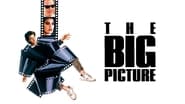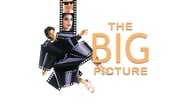classicalsteve
There are a lot of clichés you can use to describe Hollywood and the Entertainment industry, such as "Show Biz flies on the seat of its pants" or "The industry doesn't make movies to uplift people; it makes movies to make money." The one you always hear about and is probably the most true is simply "When you're hot, you're hot, and when you're not, you're not." "The Big Picture" co-written and directed by Christopher Guest is a film about being "hot" and "not" in the entertainment industry. The story centers around Nick Chapman (Kevin Bacon), recent AFI winner of the best student film, and the film begins with the awards ceremony. AFI (American Film Institute) is a film school in Los Angeles which boasts that its graduates become successful in the entertainment industry, although when you look at lists of the top talent in the industry, almost none are alumni. (The likes of Steven Spielberg, James Cameron, J.J. Abrams, and countless others never attended film school. Even Guest didn't attend film school but did graduate from a masters acting program in New York.)At the reception after the awards ceremony, Nick is approached by cut-throat studio executive Allen Habel (J.T. Walsh) who says he believes in Nick's talent. He then lands an agent, Neil Sussman (Martin Short), the ultra-sleazy and smarmy entertainment agent. Nick then has an appointment with Habel where he pitches a new movie idea. Several of the scenes with Habel involve some kind of flames, and I couldn't help but think his character loosely mirrors the Devil. Habel then begins suggesting "dramatic" changes to fundamental aspects of his original script. What had been a manage a tois between two guys and a girl up in a northern snowy area, becomes two girls and a guy at a summer beach house, and it's the two girls who "cheat" on the guy! And originally the film was supposed to be about 40-something's, and that changes to 20-something's. But Nick appears to have received the "green light", industry parlance for receiving funding and backing for a film.Emmet Sumner (Michael McKean) and his Asian-American wife are two of his best friends. Sumner is also a struggling cinematographer. He also has a loyal girlfriend, Susan Rawlings (Emily Longstreth), who is very attractive but not a supermodel type. (Sometimes she appeared intentionally dowdy to contrast with the movie star types.) He then meets Gretchen (Teri Hatcher) at one of Habel's parties, and when Nick lets on he might be directing a new film, Gretchen comes onto him like a mosquito attracted to flesh, and no less than in front of his girlfriend! Fran Drescher of "The Nanny" fame has a small role as Habel's wife.Nick then begins to disassociate with the people in his inner circle and starts to live the "life" of a Hollywood "player". He trades in his dumpy 1959 convertible for a cool new car replete with car cell phone, which was massively expensive to own in the 1980's. He starts hanging out with Gretchen and he dumps his girlfriend, renting new expensive accommodations in Beverly Hills. He also starts to blow off his friends, including Sumner. Just weeks before shooting, he reads that the studio has dumped Habel and all his projects are "dead". And then the people in the industry who had been so excited about the prospects of his new talent, avoid him like damaged goods. Even Gretchen subtly dismisses him, because he's no longer a "player" in the industry, and his agent doesn't give him much time. Now, Nick has next-to-nothing and has to fight for odd jobs around the LA Area.Generally speaking, an entertaining one-watch which is a satirical but not entirely untrue critique of the Hollywood scene. A few of the interesting aspects of this film are the inter-splicing of fantasy scenes, a bit like Woody Allen's "Play it Again, Sam". Often the scenes ring of old movies from the 40's, including a war film, a film noir, a Frank Capra picture, and even a 1960's beach movie, among others. There are also the obligatory cameos with Eliot Gould, Roddy McDowell, and John Cleese. Also, there are many "in-jokes" about the entertainment industry itself. It is no secret that many women will try to seduce men whom they believe will become "players" in the industry. One tip-off I learned after having lived in Los Angeles for a time was that if a woman you're dating only talks about the entertainment industry and nothing else, she may be looking for a career stepping-stone, and not a relationship. At one point, smarmy agent Martin Short talks about reading some scripts "almost all the way through" which is industry short-hand that he probably read the first line or two of the synopsis and the first page. If there's anything which can be said of the industry, it's people never say what they mean. And why should they? It's a world full of "actors" in every sense.
TxMike
We have a fairly new movie channel called "Movie!" and it shows quite nice, older movies. I found this one on yesterday.Released in 1989 and probably filmed in 1988, a young 30-ish Kevin Bacon stars as Nick Chapman. His character is probably early 20s, graduating filmmaker and his short film wins a student contest.The thrust of the movie, and its story, is how first, Hollywood gets on the trail of a new young filmmaker, often without even seeing his winning film. And second, after seducing him into working with them to make his new film, they start asking him to change things that will drastically alter his story.Here Nick has a love-triangle story set in the winter, with two men and a woman in a vacation cottage. The first requested change is to make it a man and two women, and the women have an affair, changes that make it a totally different story.Of course Guest is his own guy, a truly independent filmmaker, known for shooting 5X or 10X or more film than is needed, and building a movie in the editing room. So this is his parody on the corporate Hollywood machine, and how a young filmmaker needs to stick to his principles.I found it mildly interesting, it was also fun to see some of today's veteran actors in younger roles.
jdollak
There are a lot of movies that I like about the process of making a movie; Living In Oblivion, The TV Set, or even Guest's own For Your Consideration. I hadn't heard of this movie until it was brought up in a comments thread about a TV episode with a similar plot.The movie starts well, with some humor about student films. The plot mostly is just about the artistic compromises, combined with the reputation-focused existence of the Hollywood set.This is a very mildly absurdist portrayal. My biggest problem is that they didn't take the satire too far. Every compromise that was suggested could be interpreted as being an acceptable change. But the humor is also softened without the presence of someone who points out how silly these changes are. Bacon's performance seems too accepting of compromising his ideals.It's a memorable movie, and the humor is enjoyable, but it just needed to go a little bit further.





